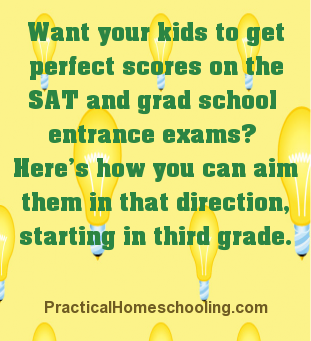 Most people think that the primary reasons that students should study mathematics is so that they will learn to work math problems and that the primary reason they should study vocabulary is so that they will be able to use and understand lots of words.
Most people think that the primary reasons that students should study mathematics is so that they will learn to work math problems and that the primary reason they should study vocabulary is so that they will be able to use and understand lots of words.
While these purposes are indeed useful, they are not the primary reasons to acquire quantitative and verbal skills.
The Tools of Thought
The most important reason to study these subjects is that mathematics and vocabulary are the principal tools with which we think. Mathematics is the language of quantitative thought - the way we understand numbers and measurement. Without math skills, quantitative thought becomes almost impossible. Similarly, a rich vocabulary is a necessary tool for qualitative thought - the way we are able to understand and analyze everything from the character of a man to the meaning of a poem to the purpose of life itself.
When my son Noah applied to graduate schools with the intention of earning a Ph.D. in chemistry, he was required to take the GRE, or Graduate Record Exams. These are essentially SAT exams for those seeking advanced degrees. The GRE is a set of three exams: two quantitative and one verbal. Noah's scores on these exams were unusually high. He scored perfect 800s on both quantitative exams and a 99 percentile score of 770 on the verbal exam. These scores and his undergraduate record were such that, at MIT, he was told that he was their top-ranked graduate applicant of the year.
Yet, the GRE math exams do not contain higher mathematics or any math problems of special difficulty, and the verbal exam is largely a vocabulary test. So why do the top science graduate schools base their admissions largely on two exams that test speed and accuracy in working simple math problems and a verbal exam that is largely a vocabulary test?
The answer is that they want, above all else, students who can think. Those who lack basic math skills and rich vocabularies simply do not have the necessary tools to do so.
Just Say No to Calculators
Noah's perfect math scores were partially the result of the fact that he had never used a calculator for any purpose until he was required to buy one for the SAT exam. Even after that, he worked virtually all homework arithmetic problems either in his head or longhand with a pencil throughout his pre-graduate education.
How to Gain a Rich Vocabulary
Fortunately, calculator-free mathematics can still easily be taught effectively in most homeschools. Vocabulary, however, poses a much more difficult problem. Teaching vocabulary in America today is roughly the equivalent of learning a foreign language without contact with native speakers. The environments of most American students no longer contain the vocabulary they need. Memorizing vocabulary by rote memory is quite difficult, and the development of an active use of words is especially arduous when the necessary words are not in use by one's peers. One of the reasons that the English speaking people have been so successful during the past few centuries is that English has a very rich vocabulary - and one of the reasons that we are beginning to see our civilization decay is that our vocabulary is being forgotten.
Without native speakers, the student must learn indirectly. Reading older books that were written in the days before American vocabularies deteriorated is a good beginning. Flash cards help, too, as does an organized program of incorporating specific words in an essay written each day. Crossword puzzles, word matching, and other vocabulary exercises also help, which is why we incorporated them in our curriculum.
So, what words should the student learn? Scholars have been thinking about this for generations. The distillation of their thought is largely found in the SAT and GRE exams themselves. Those verbal exams have been developed by thousands of very smart people over a period of more than 50 years. Ideally, your vocabulary program should include all the words used on previous SAT and GRE tests. No doubt, in a perfect world, better lists could be developed, but these are good approximations to the perfect vocabulary list.
This list of words, along with a list of the types of math problems a high-school graduate should be able to solve, is what your student needs to become an excellent thinker.
It's not just quantity (math) or quality (words) that counts, so give your children both!